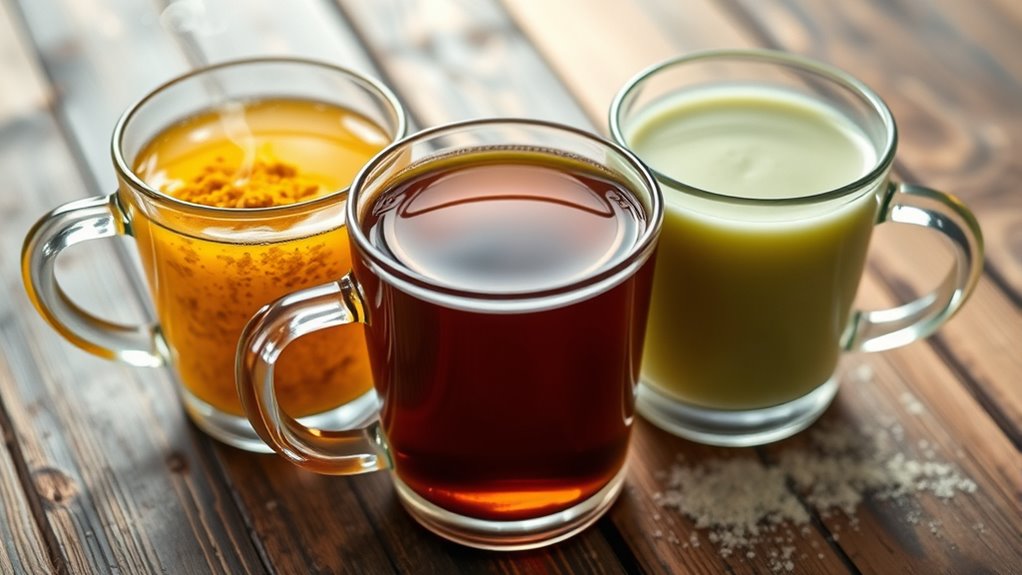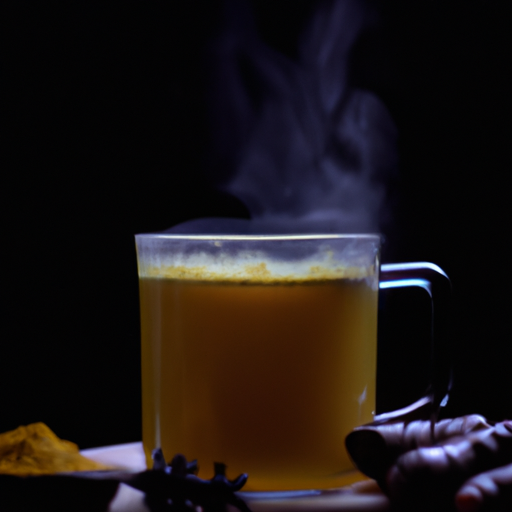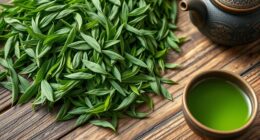Turmeric tea stands out with its anti-inflammatory and antioxidant properties, thanks to curcumin, making it ideal if you’re targeting chronic health issues like joint pain or inflammation. In contrast, black and green teas are rich in antioxidants that support heart and brain health, while herbal teas often cater to specific ailments with diverse flavors. Each type offers unique benefits and flavors, and exploring them can help you find the best fit for your wellness goals.
Key Takeaways
- Turmeric tea offers anti-inflammatory and antioxidant benefits, mainly from curcumin, unlike black or green teas which focus on catechins and theaflavins.
- The flavor profile of turmeric tea is warm and earthy, contrasting with the bold, malty taste of black tea and the light, grassy notes of green tea.
- While traditional teas support heart health and metabolism, turmeric tea primarily targets inflammation and detoxification.
- Herbal teas provide targeted relief for specific ailments but generally lack the antioxidant compounds found in turmeric, black, or green teas.
- Choosing between them depends on personal health goals and flavor preferences, with turmeric tea suited for anti-inflammatory benefits and bolder flavors.

Turmeric tea has gained popularity for its potential health benefits, but how does it compare to more traditional teas like black, green, or herbal varieties? When you explore turmeric tea, you discover that its health benefits are largely linked to curcumin, a compound known for its anti-inflammatory and antioxidant properties. These properties can help support your immune system, reduce inflammation, and even improve joint health. Additionally, turmeric tea’s antioxidant content may assist in detoxification processes, similar to green juice’s benefits. However, traditional teas like black tea contain antioxidants called theaflavins, which can support heart health, while green tea boasts catechins that may boost metabolism and enhance brain function. Herbal teas, on the other hand, often focus on specific health goals—chamomile for relaxation, peppermint for digestion, or echinacea for immune support.
Turmeric tea offers anti-inflammatory benefits, while black, green, and herbal teas provide unique antioxidant and health-supporting properties.
In terms of flavor profiles, turmeric tea provides a warm, earthy taste with a hint of bitterness and sometimes a slight peppery note, depending on how it’s prepared. Its flavor is bold and aromatic, often complemented by spices like cinnamon or ginger, which can add sweetness or heat. Traditional black teas tend to have a robust, malty, and sometimes smoky flavor, making them a strong choice for those who enjoy a full-bodied experience. Green teas offer a lighter, grassy, and slightly sweet flavor, appealing to those who prefer subtle, fresh tastes. Herbal teas are incredibly diverse in flavor—ranging from soothing chamomile’s floral notes to invigorating mint’s coolness. Each type of tea offers a distinct sensory experience, suited to different preferences and moods.
When comparing turmeric tea to other teas, you should consider not just the flavor profiles but also the health benefits you seek. While black and green teas are rich in antioxidants and have well-documented benefits, turmeric tea stands out with its anti-inflammatory properties that may target chronic conditions. Herbal teas provide targeted relief for specific ailments but often lack the same antioxidant profile. The unique chlorophyll content in turmeric tea may also contribute to its detoxifying effects, setting it apart from other herbal options. The flavor profiles also influence how you might incorporate each tea into your routine. If you enjoy bold, spicy flavors, turmeric tea could be a great addition, especially when combined with other warming spices. If you prefer a milder, more delicate taste, green or herbal teas might suit you better.
Ultimately, choosing between turmeric tea and other traditional teas depends on your health goals and flavor preferences. Each offers unique benefits and tastes, so trying different varieties can help you discover which ones best fit your lifestyle and palate.
Frequently Asked Questions
Can Turmeric Tea Replace Traditional Anti-Inflammatory Medications?
Turmeric tea can’t fully replace traditional anti-inflammatory medications, but it can serve as a natural pain relief option and an alternative remedy for mild inflammation. You might find it helpful as part of a holistic approach, combining it with other remedies and lifestyle changes. However, for serious conditions, always consult your healthcare provider before relying solely on turmeric tea, since it may not provide sufficient anti-inflammatory effects on its own.
Does Turmeric Tea Have Any Known Interactions With Medications?
You should be aware that turmeric tea can have drug interactions, especially if you’re on blood thinners or medications for diabetes. While it’s generally safe, it’s wise to consult your healthcare provider before adding it to your routine. Medical precautions include monitoring for adverse effects and adjusting medication if needed. Staying informed helps you enjoy turmeric tea’s benefits without risking unwanted interactions or health issues.
How Does Turmeric Tea Affect Sleep Compared to Other Herbal Teas?
Turmeric tea can promote sleep improvement and relaxation benefits more effectively than some herbal teas due to its anti-inflammatory compounds. You might find it helps calm your mind and reduce discomfort, making it easier to fall asleep. Unlike teas with caffeine or stimulating herbs, turmeric tea provides gentle relaxation without interference. Incorporate it into your routine to enhance sleep quality naturally, especially when combined with other calming practices.
Is Turmeric Tea Safe for Children or Pregnant Women?
Turmeric tea’s safety for children and pregnant women depends on dosage and individual health. Generally, it’s best to consult your healthcare provider before giving it to children or consuming it during pregnancy. Children’s safety can be affected by turmeric’s potential to cause allergic reactions, while pregnancy considerations include avoiding excessive intake that might stimulate uterine contractions. Always prioritize medical advice to guarantee safe consumption during these sensitive periods.
How Does the Caffeine Content of Turmeric Tea Compare to Green or Black Teas?
Think of turmeric tea as a gentle stream, quietly flowing without the rush of a bustling river. Its caffeine levels are minimal, making its stimulant effects quite mild compared to green or black teas, which are like lively rapids with higher caffeine content. If you’re sensitive to caffeine, turmeric tea offers a calming alternative, providing health benefits without the jittery effects often linked to higher-stimulant teas.
Conclusion
So, when you compare turmeric tea to other teas, it’s like choosing between a vibrant sunrise and a calm sunset—you get a unique experience each time. Turmeric’s bold, earthy flavor and health perks make it stand out, but don’t forget the soothing comfort of chamomile or the energizing kick of green tea. Ultimately, the best tea is the one that speaks to your soul—so sip, savor, and enjoy your perfect brew.










